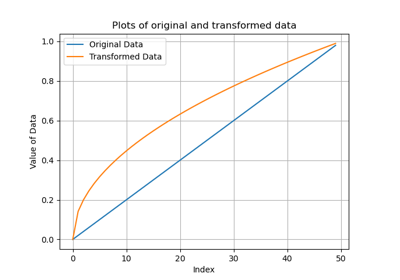TemplateTransformer#
- class skltemplate.TemplateTransformer(demo_param='demo')#
An example transformer that returns the element-wise square root.
For more information regarding how to build your own transformer, read more in the User Guide.
- Parameters:
- demo_paramstr, default=’demo’
A parameter used for demonstation of how to pass and store paramters.
- Attributes:
Methods
fit(X[, y])A reference implementation of a fitting function for a transformer.
fit_transform(X[, y])Fit to data, then transform it.
Get metadata routing of this object.
get_params([deep])Get parameters for this estimator.
set_output(*[, transform])Set output container.
set_params(**params)Set the parameters of this estimator.
transform(X)A reference implementation of a transform function.
- fit(X, y=None)#
A reference implementation of a fitting function for a transformer.
- Parameters:
- X{array-like, sparse matrix}, shape (n_samples, n_features)
The training input samples.
- yNone
There is no need of a target in a transformer, yet the pipeline API requires this parameter.
- Returns:
- selfobject
Returns self.
- fit_transform(X, y=None, **fit_params)#
Fit to data, then transform it.
Fits transformer to
Xandywith optional parametersfit_paramsand returns a transformed version ofX.- Parameters:
- Xarray-like of shape (n_samples, n_features)
Input samples.
- yarray-like of shape (n_samples,) or (n_samples, n_outputs), default=None
Target values (None for unsupervised transformations).
- **fit_paramsdict
Additional fit parameters.
- Returns:
- X_newndarray array of shape (n_samples, n_features_new)
Transformed array.
- get_metadata_routing()#
Get metadata routing of this object.
Please check User Guide on how the routing mechanism works.
- Returns:
- routingMetadataRequest
A
MetadataRequestencapsulating routing information.
- get_params(deep=True)#
Get parameters for this estimator.
- Parameters:
- deepbool, default=True
If True, will return the parameters for this estimator and contained subobjects that are estimators.
- Returns:
- paramsdict
Parameter names mapped to their values.
- set_output(*, transform=None)#
Set output container.
See Introducing the set_output API for an example on how to use the API.
- Parameters:
- transform{“default”, “pandas”}, default=None
Configure output of
transformandfit_transform."default": Default output format of a transformer"pandas": DataFrame output"polars": Polars outputNone: Transform configuration is unchanged
Added in version 1.4:
"polars"option was added.
- Returns:
- selfestimator instance
Estimator instance.
- set_params(**params)#
Set the parameters of this estimator.
The method works on simple estimators as well as on nested objects (such as
Pipeline). The latter have parameters of the form<component>__<parameter>so that it’s possible to update each component of a nested object.- Parameters:
- **paramsdict
Estimator parameters.
- Returns:
- selfestimator instance
Estimator instance.
- transform(X)#
A reference implementation of a transform function.
- Parameters:
- X{array-like, sparse-matrix}, shape (n_samples, n_features)
The input samples.
- Returns:
- X_transformedarray, shape (n_samples, n_features)
The array containing the element-wise square roots of the values in
X.

